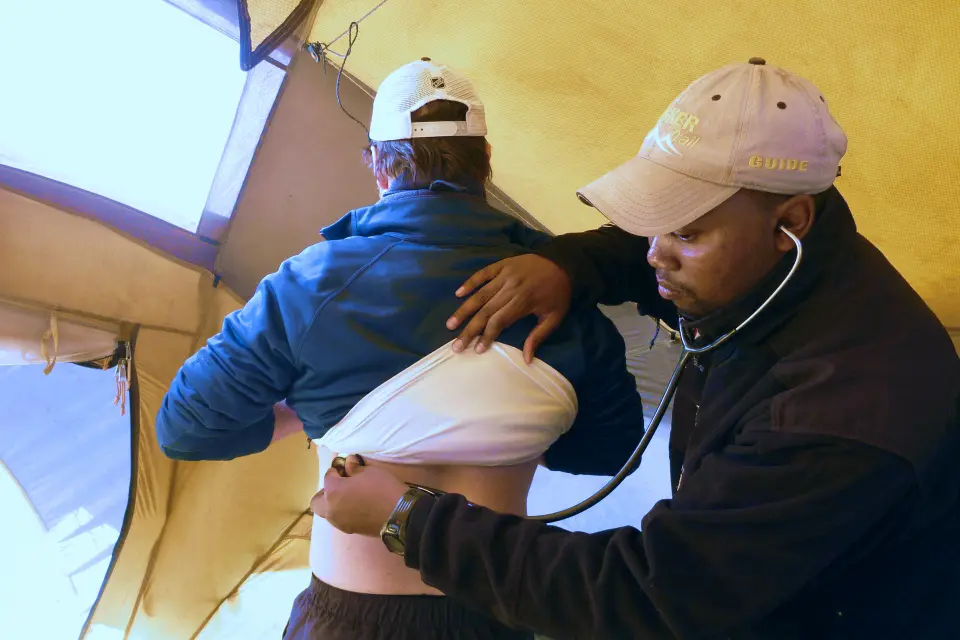Climbing Kilimanjaro: The Vital Role of a Medically Trained Guiding Team
You’re thinking of climb Africa’s tallest peak, Mount Kilimanjaro. The air is thin, the terrain rugged, and the challenge immense. It’s a trek of a lifetime, a test of your physical and mental endurance. But there’s one crucial element that often gets overshadowed by the sheer awe of the mountain itself—the medically trained guiding team.
Kilimanjaro is no ordinary mountain. It’s a dormant volcano that soars 19,341 feet above sea level, towering over the African landscape like a sentinel of the skies. While it may not be as technically demanding as some other peaks, such as Everest, Kilimanjaro presents unique challenges. Altitude sickness, extreme weather conditions, and rugged terrain can turn an exhilarating adventure into a life-threatening situation. That’s where the importance of a medically trained guiding team becomes crystal clear.
Imagine for a moment that you’re halfway up the mountain, gazing at the breathtaking vistas that stretch out before you. The beauty is astounding, but the air is thin, and your body is struggling to adapt to the decreasing oxygen levels. This is where the expertise of an experienced medically trained guiding team comes into play. They are not just guides; they are your lifeline to safety.
One of the greatest dangers on Kilimanjaro is altitude sickness. As you ascend, the air pressure drops, and oxygen becomes scarce. This can lead to symptoms ranging from headaches and nausea to more severe conditions like high-altitude pulmonary edema (HAPE) and high-altitude cerebral edema (HACE). A medically trained guiding team with deep experience understands these risks and knows how to monitor your health, identify symptoms, and take immediate action to prevent serious complications.
These dedicated professionals are equipped with the knowledge and resources to make crucial decisions that could mean the difference between life and death. They carry oxygen tanks, pulse oximeters, and first-aid supplies, ready to respond to any medical emergency. With their guidance, you can safely push your limits, knowing that you have a team of experts watching over you.
But it’s not just about reacting to emergencies; it’s also about prevention. A medically trained guiding team will meticulously plan your trek, ensuring that you acclimatize properly and minimize the risk of altitude sickness. They will set a manageable pace, encourage proper hydration and nutrition, and constantly assess your physical condition. This proactive approach significantly reduces the chances of encountering health issues during your climb.
Weather on Kilimanjaro can be notoriously unpredictable. One moment, you’re bathed in sunlight, and the next, you’re caught in a blizzard. Extreme temperature variations, high winds, and heavy precipitation are common occurrences. A medically trained guiding team understands the mountain’s fickle nature and comes prepared with the right gear and strategies to keep you safe. They’ll make sure you’re adequately dressed, properly sheltered, and have access to warm meals and beverages when needed.
Furthermore, a medically trained guiding team is not just there for your physical well-being; they also provide crucial emotional support. Climbing Kilimanjaro is a mental battle as much as a physical one. At times, doubt and exhaustion may creep in, but having experienced guides by your side can boost your morale and keep you motivated to reach the summit.
Numerous companies in the industry claim to offer medical equipment, but often lack the necessary expertise to use it effectively. In contrast, Tusker Trail stands out as one the few medically trained and reputable Kilimanjaro climbing companies. The company’s owners, who are experienced and medically trained climbing guides themselves, have introduced a specialized medical training program tailored for their full-time Tanzanian guides. This High Altitude First Responder Course, places a strong emphasis on the unique climbing conditions found on Kilimanjaro. Notably, Tusker Trail maintains a dedicated boots-on-the-ground guiding team, ensuring control over safety standards and the comprehensive training of their guides.
Mount Kilimanjaro is a majestic wonder, but it’s a formidable challenge that demands the utmost respect. The importance of a competent medically trained guiding team cannot be overstated. They are your guardians on this extraordinary journey, ensuring your safety, health, and success. With their expertise, you can confidently embark on the adventure of a lifetime, knowing that you are in the best hands possible. So, gear up, and achieve the summit on Kilimanjaro with the confidence that comes from having the most qualified guides at your side.



